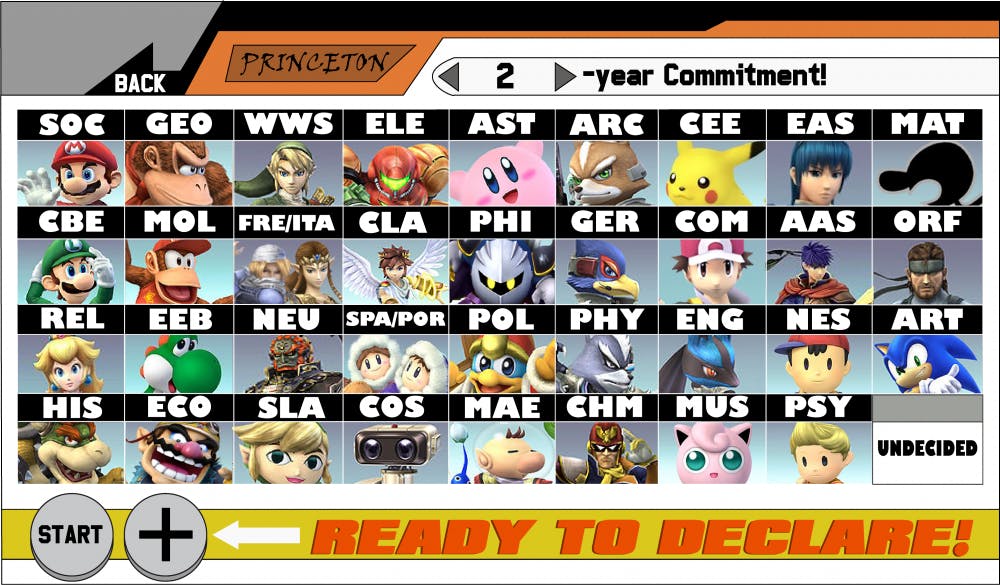As I begin my sophomore year at the University, I’ve become more serious about my academic career — especially relating to major choice. Having developed a broad set of interests from the courses here, I am conflicted about what discipline I should choose — the area of study that will label and define my university education. And while I’m being a bit overdramatic about it, I am sure that this concern is not unique to myself.
But what if the problem lies not in our inability to choose, but rather in the lack of options to choose from? Instead of forcing students to select a major that fits the more “traditional” conception of a liberal arts education, the University should seek to expand the number of majors that it offers.
This is not to say that we should have more academic departments, although that could surely be done as well — rather, there needs to be more major programs that lie at the intersection of different disciplines or are more specific in nature.
This is not at all a radical proposal. Most universities have adopted such policies already. Take a look at Yale’s academic program introduction page. Not only do they offer 80 majors — compared to the 37 concentration options offered at Princeton — but the programs tend to be tailored to student interest, often lying at the intersection of two different broader disciplines.
Offering more specific, diverse major options would grant students much more freedom and flexibility in navigating through their academic career at the University. It is only natural that the talented and intelligent people on this campus have a variety of interests, and specific disciplines like “Computing and the Arts” would allow students to dive into such diverse kinds of interests with depth. As such, this seems to be a better method to achieve the University’s stated goal of providing a liberal arts education as well.
The current certificate programs, while aiding the pursuit of diverse interests, are insufficient. By virtue of them being the equivalent of minors, not only are they often overlooked by a vast majority of the students, but it is also difficult to pursue them along with the already high bar set for even just concentrating in something here.
To get a Princeton education somewhat equivalent to a “Physics & Philosophy” major at Yale, students would have to fulfill requirements of the physics major along with those of a Values & Public Life certificate, which, when considering the junior paper (JP) and thesis requirements as well, could be an incredibly large burden.
Same goes for the option to design your own major. Not only are many students simply unaware of the option, but they also have to navigate through the challenges of deciding the number of courses, counseling with multiple professors, and going through other annoying steps just to have the option of an interdisciplinary major.
Regarding certificate programs, there are concerns about a lack of depth of education received, or that students will just be taking courses all over the place without a sense of focus. This begs the question of what kind of study we should consider as being “focused enough.” Where do we draw the line?
Divisions among disciplines are often arbitrary. They can be generated more for human convenience than for the fact that they are actually distinct. Politics and economics, for example, were only “separated” into distinct areas of study about 100 years ago, when economics as a topic area seemed to become more complex in nature.
Novel discoveries and revolutionary research could be better done when scholars learn at the intersection of different fields. Learning at the intersection would allow students to obtain novel perspectives that could add to the field of knowledge they already have, which in turn would give them a broader worldview.
On a much more practical level, the conjoining of different departments and devising distinct programs encourages a higher level of connectivity among different departments at the University. And for the students, this also means that there could exist a broader access to resources offered by different departments — for instance, when thinking about a JP or thesis adviser, one could have much easier access to professors in different departments.

These benefits, while seemingly small, add up to formulate an overall curriculum that not only guarantees the breadth of education offered, but also captures the depth of the kind of knowledge that students end up inculcating. Students get to explore more freely, and the kinds of research they dive into will also be much more interesting and diverse in nature, as they are not “trapped” within one way of thinking.
While it may be difficult to add many majors at one time, gradually diversifying the academic programs offered should be a goal of the Princeton administration and departments. By gauging student-body interest and evolving societal trends, we’d see the pressure to expand the major options that we do have now. Let me major in other things.
Jae-Kyung Sim is a sophomore from Sejong City, South Korea. He can be reached at j.sim@princeton.edu.








